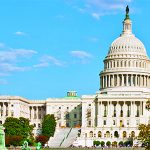The Supreme Court heard arguments in the case Bank of America Corp. v. City of Miami, perhaps the most significant of legal questions heard by the Court this term. The case centers on whether the Fair Housing Act (FHA) permits Miami to sue mortgage lenders as an “aggrieved person” for alleged racial discrimination in the … Continue reading “The Cities Fight the Banks: The Case of Bank of America v. City of Miami”
This lunchtime discussion featured the topic of civil justice reform in the 115th Congress. Our distinguished panel identified likely regulatory changes and the challenges to implementing them. This Congressional Civil Justice Caucus Academy briefing featured: Pamela Gilbert Partner, Cuneo Gilbert & LaDuca, LLP Victor E. Schwartz Partner, Shook Hardy & Bacon, LLP Matt Webb Senior Vice President, … Continue reading “Moving Toward Civil Justice Reform in the 115th Congress”
Arbitration is used to resolve common legal disputes and to avoid often costly litigation. It has been a standard practice used by both businesses and consumers alike for decades but has recently been challenged by the accelerated growth of expensive class action suits. These suits purport to benefit consumers, but do they? What about the … Continue reading “The Next Round in the Arbitration Fight”
Over the past 40 years almost all former major asbestos producers have been forced into bankruptcy. By reorganizing, these companies are now exempt from personal injury litigation. In their wake, trusts have been established to pay people for harms caused by their products. Collectively, these trusts hold billions of dollars in assets. The tort system … Continue reading “Toward Greater Transparency in Asbestos Litigation”
The Fairness in Class Action Litigation Act of 2017, a bill intended to curb class action lawsuits in several significant ways, has passed in the House of Representatives. Among its provisions are limitations to class certification and ceilings on attorney’s fees. As a result, the bill faces strong opposition from consumer and public interest groups … Continue reading “Class Action Reform Moves Ahead: What’s Next?”
Even without a clear replacement for the Affordable Care Act, the issue of limiting medical malpractice awards remains a key component of legislative reform efforts. This panel re-examined the issue of medical malpractice, its impact on the health care system, and what may develop next in the reform process. This Congressional Civil Justice Caucus Academy … Continue reading “Medical Malpractice Reform”
This program examined decisions of the US Supreme Court’s 2016-2017 term, including: Bristol Myers-Squibb vs. Superior Court of California and TC Heartland v. Kraft Foods, judgments involving so-called forum-shopping. These educational programs were initiated by a bipartisan caucus of House members in 2011 as a vehicle to advance understanding of civil justice issues affecting the economy … Continue reading “Civil Justice Review of the US Supreme Court’s 2016-2017 Term”
The 2011 America Invents Act was intended to reduce costly delays and unnecessary litigation in the U.S. patent system. Among other changes, the Act created a Patent Trial and Appeal Board (PTAB) within the Patent Office to review third-party claims that a patent was inappropriately granted and to adjudicate disputes arising out of infringement claims. … Continue reading “The America Invents Act On Trial”
From tech companies to automobile manufacturers, driverless cars are the next big thing. But who’s responsible when a driverless car is involved in an accident? Should it be the occupants of the vehicle or its owner? The car’s manufacturer or the software developer? A number of the companies working in this field have announced that … Continue reading “Autonomous Vehicles: Who to Sue if There’s No Driver?”
In November, the Department of Justice brought suit to block the merger of AT&T and Time Warner, claiming the merger would reduce market competition and harm consumers. The DOJ asserts that the merger would allow the newly formed company to use its market power to increase prices or demand more favorable terms from content providers. … Continue reading “Antitrust Law in a Digital World: The AT&T and Time Warner Merger”

